Key moments which led to Venezuela protests
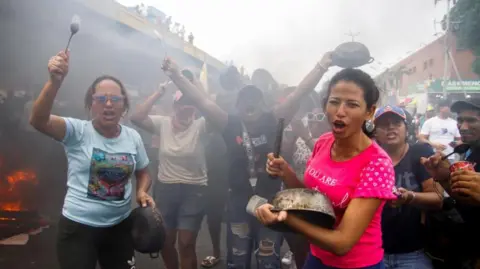 Reuters
ReutersThere have been protests across Venezuela following the announcement on Monday of the disputed result of the presidential election.
The National Electoral Council (CNE) - which is dominated by government allies - declared Nicolás Maduro the winner.
The CNE's announcement has been widely decried as fraudulent both inside and outside Venezuela with the Carter Center demanding the CNE publish the detailed voting tallies.
The opposition says the tallies it has had access to - which it has made public - show that its candidate, Edmundo González, is the clear winner.
Here we look at some of the key moments which have led to thousands of Venezuelans taking to the streets in protest.
Long queues, delays and difficulties registering to vote
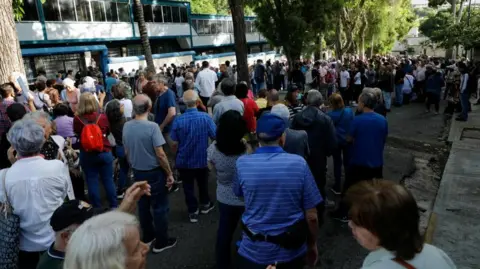 Reuters
ReutersEven before polling stations opened at 06:00 local time on Sunday, long lines formed at many locations with some voters queueing overnight.
There were reports of some voters being blocked from accessing their polling stations, while at others there were long delays.
Some of those keen to cast their ballot joined in a chorus of "We want to vote".
Many of the 7.8m Venezuelans who have fled their country's economic and political crisis were not able to cast their votes after they encountered problems adding their names to the electoral register.
The hurdles they faced included strict requirements such as having to provide proof of legal residence in the host country and providing a valid identity card as passports were not accepted as a form of identification.
As identity cards are not issued by Venezuelan consulates abroad, this meant many Venezuelans whose IDs had expired could not vote.
Many also reported being left off the list of voters altogether or appearing on local registers in Venezuela rather than in their current countries of residence.
Others complained of consulates only opening for voter registration for very limited times.
Official figures from the CNE show that fewer than 68,000 people overseas were registered to vote, even though an estimated half of the 7.8m Venezuelans abroad are of voting age.
Government ally on electoral council declares Maduro victory
Venezuela's National Electoral Council (CNE) has five members who are nominated by the legislative body, the National Assembly.
While it was created as an independent body to organise and oversee elections, it has long been dominated by allies of the governing PSUV party.
Its president, Elvis Amoroso, is a former lawmaker for President Maduro's socialist PSUV party who went to work as Mr Maduro's legal adviser.
Before being named head of the CNE, he served as comptroller general. In that post, he barred opposition leader María Corina Machado from running for office for 15 years.
As head of the CNE, he revoked the invitation which had been issued to the European Union to send independent electoral observers to monitor the presidential election.
In the early hours on Monday, Mr Amoroso announced that with 80% of the votes counted, President Maduro had an "unassailable lead" with 51% of the vote.
He said that the opposition candidate, Edmundo González, had 44% of the vote.
However, the CNE did not provide a detailed breakdown of the results from individual polling stations.
Nicolás Maduro celebrates and mocks opposition
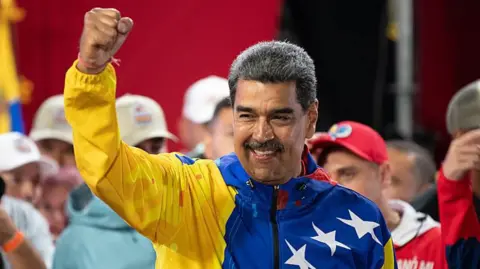 Getty Images
Getty ImagesThe incumbent celebrated the announcement outside the Miraflores presidential palace.
"I am Nicolás Maduro Moros, the re-elected president of the Bolivarian Republic of Venezuela and I will defend our democracy, our laws and our people," he shouted.
Before a crowd of loyal supporters, he mocked and mimicked former opposition and current opposition leaders , whom he accused of "crying fraud" every time they lost an election.
He praised the electoral system and urged "respect" for "Venezuela's sovereignty".
Mr Maduro also alleged that the CNE had been the target of a "massive hacking attack" on election night because "the demons didn't want the total tally to be announced". "We already he know who it was," he said.
"We are setting an example for the world," he told his cheering supporters.
Opposition denounces CNE's result as fraudulent and provides tallies
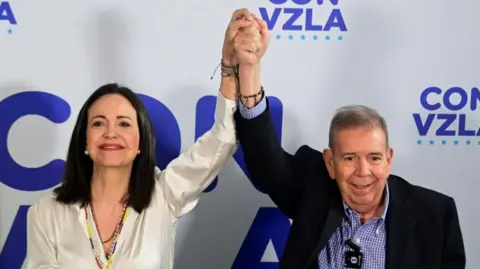 Reuters
ReutersShortly after the CNE had declared Mr Maduro's victory, opposition leader María Corina Machado denounced the result as fraudulent.
She said that the opposition had had access to 40% of the voting tallies and they suggested that opposition candidate Edmundo González had won with 70% of the votes.
In a news conference some hours later on Monday, Ms Machado said the opposition had been able to review 73.2% of the voting tallies and they confirmed that Mr González was the winner of the election.
She said that those voting tallies showed that Nicolás Maduro had 2.75m votes compared to Mr González's 6.27m votes.
She added that even if all the votes in the remaining 26.8% of tallies the opposition had not had access to yet were for Mr Maduro, it would not be enough to beat Mr González.
"We have the records showing our categorical and mathematically irreversible victory," Mr González said.
Ms Machado also announced that the opposition had uploaded the voting tallies to a website so that the Venezuelan people and independent observer could scrutinise them.
Electoral council doubles down, declares Maduro re-elected
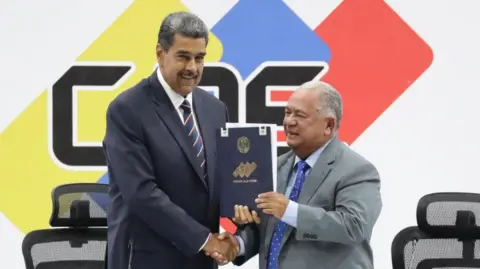 EPA
EPADespite international and national scepticism and criticism expressed about the result released by the CNE, the electoral authority doubled down on Monday.
It announced that all of the votes had been counted and declared Mr Maduro re-elected to a third consecutive term.
Elvis Amoroso, who has been a close ally of Mr Maduro for years, handed him the credentials for the presidential term from 2025-2031.
Even though it pressed ahead with the formalities, the CNE still failed to provide access to all of the voting tallies, despite pressure by the Carter Center, one of the few international organisations allowed as observers, to do so.
Security forces and pro-government groups confront protesters
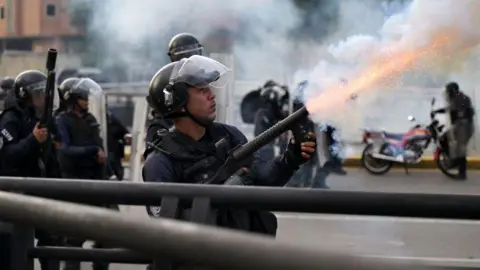 Getty Images
Getty ImagesThe already tense atmosphere was further inflamed by pro-government groups, the so-called colectivos and by clashes between protesters and the security forces.
In one incident, members of a colectivo attacked people who were waiting to enter a polling station to witness the vote count.
A non-governmental group said on Tuesday that three people had died and dozens were injured in the protests which have erupted across Venezuela.
Also on Tuesday, Venezuela's attorney-general said 749 had been arrested during anti-government protests.
A Venezuelan opposition party - Voluntad Popular - said its national coordinator, Freddy Superlano, was among those detained.
